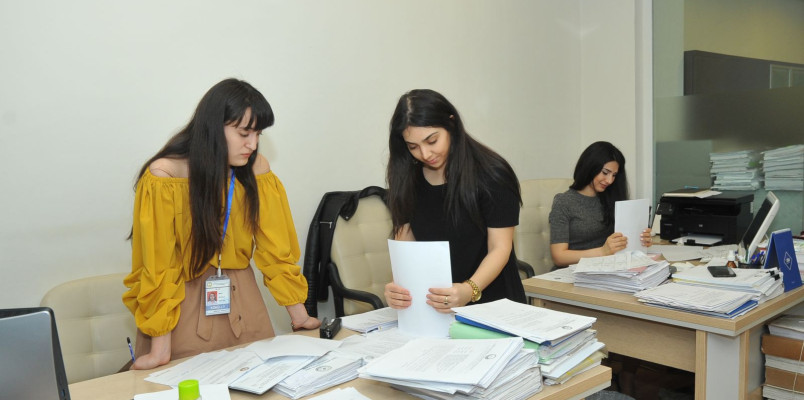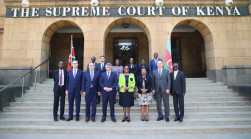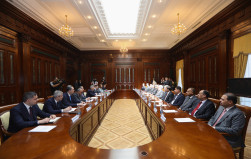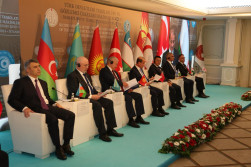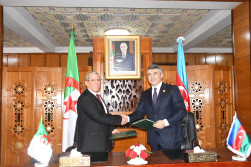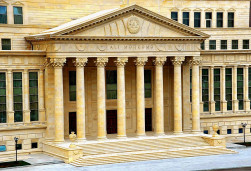Plenum of the Supreme Court 17.02.2012
01.01.2019, 00:00The next Plenum session of the Supreme Court of the Azerbaijan Republic chaired by Mr. Ramiz Rzayev took place on February 17, 2011.
Opening Plenum session, the chairman of the Supreme Court said that the year 2011 was remembered by number of significant events. One of the most important event, was carrying a solemn event dedicated to 20th anniversary of the restoration of state independence of Azerbaijan. A new form of judicial power is the product of national independence.
In past years, several works were carried out concerning the execution of decrees of the President of the Republic of Azerbaijan Mr. IlhamAliyev in the judicial system, and for the improvement and modernization of the Supreme Court. Legal and information support of the Supreme Court was enhanced, new technologies have been applied in the Administration, financial support of the judges was improved, and also material and technical basis of the Supreme Court was reinforced. At the same time in comparison with previous years the level of judicial protection of the civil rights rose within 2011.
Chairman of the Supreme Court noted that after the accession of the Republic of Azerbaijan to the European Convention on Human Rights and Fundamental Freedoms, the case law of the European Court of Justice is essential for our legal system. The recognition by the state the jurisdiction of the European Court, especially beneficial for the citizens of Azerbaijan. Citizens have the opportunity to appeal to the European Court of Human Rights, the requirements to the activity of courts and law enforcement have increased. Due to the importance of assimilation of the international law by judges who administer justice, and application of international standards of human rights by them, the international legal acts, especially the European Convention’s precedent law on “Protection of Human Rights and Fundamental Freedoms” are studied at the seminars which are held in the Supreme Court every week. Roundtables are held with the participation of judges and representatives of the international organizations are invited. Familiarization visits which help to learn judicial practice of the European states are organized.
The Chairmen of Boards of the Supreme Court gave the information on process of the implementation of justice in 2011.
The given information was discussed and analyzed on Plenum.
The Chairmen of Boards who made a speech on the Plenum also noted that the activity of the boards had progressed in 2011.
In comparison with the appropriate period of 2010, the number of the tried cases which were received to the all Boards of the Supreme Court had increased in 2011. In the Board on Civil cases was observed an increase by 2,5 %, in the Administrative- Economic Board by 25,5 %, in the Board on Criminal cases by 26,6 %, in the Board on Cases of Military Courts was observed an increase by 16,3 %. In generally, the number of cases received to the Supreme Court, increased by 8, 1 %.
Despite the number of the examined cases has increased, the number of the canceled decisions has decreased. It shows that the quality of the decisions made by the lower instance in comparing with the previous years had increased.
In 2011 was raised the attention to the consideration of the applications, complaints, and other references and to the correct and well-grounded answers to them at legal level. The number of appeals to the Supreme Court had increased. This can be considered as strengthening of citizens trust to the courts.
In 2011, the Plenum of the Supreme Court held six meetings and took 31 decisions.
Work schedule of the Supreme Court for first half of 2012 was confirmed on Plenum.
Plenum also considered concrete cases.
Plenum made corresponding decisions, concerning the discussed issues and considered cases.
Opening Plenum session, the chairman of the Supreme Court said that the year 2011 was remembered by number of significant events. One of the most important event, was carrying a solemn event dedicated to 20th anniversary of the restoration of state independence of Azerbaijan. A new form of judicial power is the product of national independence.
In past years, several works were carried out concerning the execution of decrees of the President of the Republic of Azerbaijan Mr. IlhamAliyev in the judicial system, and for the improvement and modernization of the Supreme Court. Legal and information support of the Supreme Court was enhanced, new technologies have been applied in the Administration, financial support of the judges was improved, and also material and technical basis of the Supreme Court was reinforced. At the same time in comparison with previous years the level of judicial protection of the civil rights rose within 2011.
Chairman of the Supreme Court noted that after the accession of the Republic of Azerbaijan to the European Convention on Human Rights and Fundamental Freedoms, the case law of the European Court of Justice is essential for our legal system. The recognition by the state the jurisdiction of the European Court, especially beneficial for the citizens of Azerbaijan. Citizens have the opportunity to appeal to the European Court of Human Rights, the requirements to the activity of courts and law enforcement have increased. Due to the importance of assimilation of the international law by judges who administer justice, and application of international standards of human rights by them, the international legal acts, especially the European Convention’s precedent law on “Protection of Human Rights and Fundamental Freedoms” are studied at the seminars which are held in the Supreme Court every week. Roundtables are held with the participation of judges and representatives of the international organizations are invited. Familiarization visits which help to learn judicial practice of the European states are organized.
The Chairmen of Boards of the Supreme Court gave the information on process of the implementation of justice in 2011.
The given information was discussed and analyzed on Plenum.
The Chairmen of Boards who made a speech on the Plenum also noted that the activity of the boards had progressed in 2011.
In comparison with the appropriate period of 2010, the number of the tried cases which were received to the all Boards of the Supreme Court had increased in 2011. In the Board on Civil cases was observed an increase by 2,5 %, in the Administrative- Economic Board by 25,5 %, in the Board on Criminal cases by 26,6 %, in the Board on Cases of Military Courts was observed an increase by 16,3 %. In generally, the number of cases received to the Supreme Court, increased by 8, 1 %.
Despite the number of the examined cases has increased, the number of the canceled decisions has decreased. It shows that the quality of the decisions made by the lower instance in comparing with the previous years had increased.
In 2011 was raised the attention to the consideration of the applications, complaints, and other references and to the correct and well-grounded answers to them at legal level. The number of appeals to the Supreme Court had increased. This can be considered as strengthening of citizens trust to the courts.
In 2011, the Plenum of the Supreme Court held six meetings and took 31 decisions.
Work schedule of the Supreme Court for first half of 2012 was confirmed on Plenum.
Plenum also considered concrete cases.
Plenum made corresponding decisions, concerning the discussed issues and considered cases.
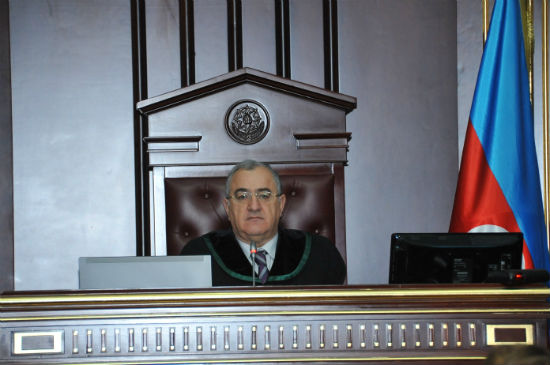
Göstərilən platformalarda paylaş:


